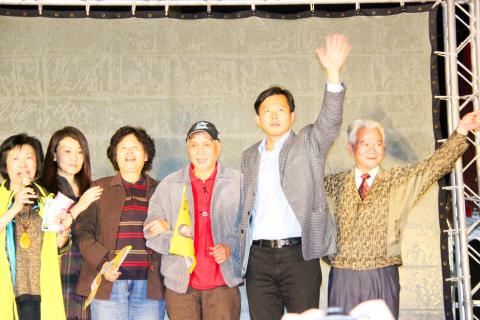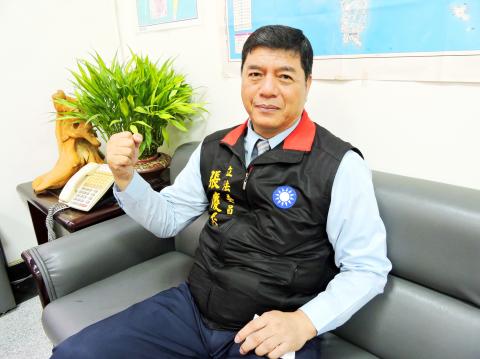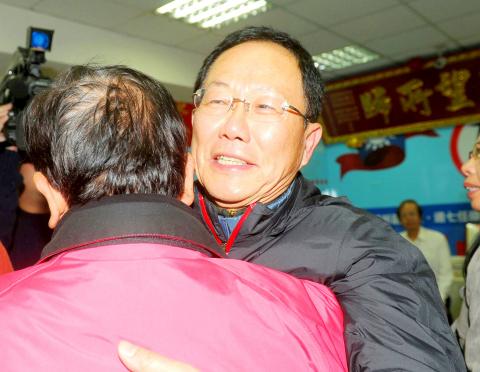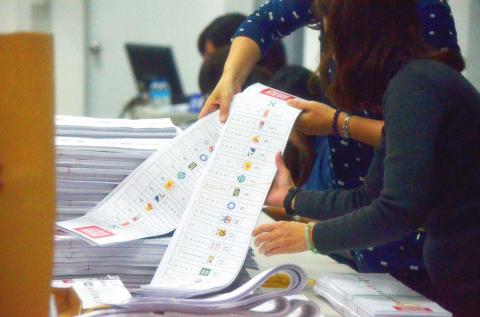The New Power Party (NPP) won five seats in yesterday’s legislative elections to become the third-largest party, representing a triumph for the new “third force” party founded by civil activists associated with the 2014 Sunflower movement.
The NPP scored two legislator at-large seats, winning 6.1 percent of the legislator at-large party vote, in a sharp drop from pre-election polling after the Democratic Progressive Party (DPP) issued calls for pan-green voters to concentrate their votes to protect the “safe” seats on its legislator-at-large list.
However, DPP endorsements helped push some of the party’s district candidates to victory, with former Academia Sinica researcher Huang Kuo-chang (黃國昌) winning New Taipei City’s 12th district, Hung Tzu-yung (洪慈庸) — who is best known for speaking on behalf of her bereaved family after her younger brother, army corporal Hung Chung-chiu (洪仲丘), died in July 2013 under controversial circumstances only days from being discharged — winning Taichung’s third district, and metal band Chthonic’s lead vocalist Freddy Lim (林昶佐) winning a tight race for Taipei’s fifth district in a surprise upset.

Photo: CNA
The DPP endorsed Huang, Lim and Hung in a bid to topple Chinese Nationalist Party (KMT) incumbents in what were previously considered pan-blue districts.
The party’s other district candidate, human rights lawyer Chiu Hsien-chih (邱顯智), was defeated by former DPP caucus whip Ker Chien-ming (柯建銘) in a three-way race for Hsinchu City’s legislative district after refusing to drop out of the race in response to DPP pressure.
The NPP’s success came as the Taiwan Solidarity Union’s (TSU) support crumbled, losing all three of its legislator-at-large seats.

Photo: Lin Hsin-han, Taipei Times
Pairing with the pro-independence leftist activist group Radical Flank (基進側翼), whose Chairman Chen Yi-chi (陳弈齊) headed the party’s legislator-at-large slate, failed to ward off a sharp drop in support, with the party winning 2.5 percent of the at-large vote, falling short of the 8.96 percent it won in 2012.
National Taiwan University political science professor Wang Yeh-lih (王業立) said the rise of the NPP was the main factor behind the TSU’s decline.
“The NPP stems from the leadership of the Sunflower movement, which opposed a trade in services agreement with China, so they attracted a substantial portion of voters dissatisfied with China. These voters mainly voted for the TSU in the election four years ago,” National Taiwan University political science professor Wang Yeh-lih (王業立) said. “As TSU’s candidates were not as well-known as the NPP’s, and the NPP is skilled at using new media, the NPP was able to achieve much greater visibility than the TSU.”

Photo: Lai Hsiao-tung, Taipei Times
The Green Party-Social Democratic Party Alliance won only 2.52 percent of the legislator at-large vote, also failing to win any district seats.
The Social Democratic Party, which was founded by many long-standing social campaigners, had competed with the NPP to carry the “third force” banner after a split within the movement, joining forces within the Green Party after integration talks broke down over relations with the DPP.
While the NPP endorsed DPP presidential candidate Tsai Ing-wen (蔡英文) and — with the exception of Chiu — competed only for districts where the DPP “made way,” the alliance did not coordinate with the DPP.

Photo: CNA
The People First Party (PFP) received 6.52 percent of the legislator-at-large vote, holding on to its two legislator-at-large seats.
The New Party received 4.18 percent of the vote, crossing the newly lowered 3.5 percent threshold to receive election subsidies.
The Republican Party received only 1.62 percent of the vote, while losing its sole legislative seat representing Hsinchu County, after the party’s chairwoman and sole legislator Hsu Hsin-ying (徐欣瑩) withdrew from the race to serve as PFP presidential candidate James Soong’s (宋楚瑜) running mate.

Photo: CNA

A preclearance service to facilitate entry for people traveling to select airports in Japan would be available from Thursday next week to Feb. 25 at Taiwan Taoyuan International Airport, Taoyuan International Airport Corp (TIAC) said on Tuesday. The service was first made available to Taiwanese travelers throughout the winter vacation of 2024 and during the Lunar New Year holiday. In addition to flights to the Japanese cities of Hakodate, Asahikawa, Akita, Sendai, Niigata, Okayama, Takamatsu, Kumamoto and Kagoshima, the service would be available to travelers to Kobe and Oita. The service can be accessed by passengers of 15 flight routes operated by

Alain Robert, known as the "French Spider-Man," praised Alex Honnold as exceptionally well-prepared after the US climber completed a free solo ascent of Taipei 101 yesterday. Robert said Honnold's ascent of the 508m-tall skyscraper in just more than one-and-a-half hours without using safety ropes or equipment was a remarkable achievement. "This is my life," he said in an interview conducted in French, adding that he liked the feeling of being "on the edge of danger." The 63-year-old Frenchman climbed Taipei 101 using ropes in December 2004, taking about four hours to reach the top. On a one-to-10 scale of difficulty, Robert said Taipei 101

Taiwanese and US defense groups are collaborating to introduce deployable, semi-autonomous manufacturing systems for drones and components in a boost to the nation’s supply chain resilience. Taiwan’s G-Tech Optroelectronics Corp subsidiary GTOC and the US’ Aerkomm Inc on Friday announced an agreement with fellow US-based Firestorm Lab to adopt the latter’s xCell, a technology featuring 3D printers fitted in 6.1m container units. The systems enable aerial platforms and parts to be produced in high volumes from dispersed nodes capable of rapid redeployment, to minimize the risk of enemy strikes and to meet field requirements, they said. Firestorm chief technology officer Ian Muceus said

MORE FALL: An investigation into one of Xi’s key cronies, part of a broader ‘anti-corruption’ drive, indicates that he might have a deep distrust in the military, an expert said China’s latest military purge underscores systemic risks in its shift from collective leadership to sole rule under Chinese President Xi Jinping (習近平), and could disrupt its chain of command and military capabilities, a national security official said yesterday. If decisionmaking within the Chinese Communist Party has become “irrational” under one-man rule, the Taiwan Strait and the regional situation must be approached with extreme caution, given unforeseen risks, they added. The anonymous official made the remarks as China’s Central Military Commission Vice Chairman Zhang Youxia (張又俠) and Joint Staff Department Chief of Staff Liu Zhenli (劉振立) were reportedly being investigated for suspected “serious